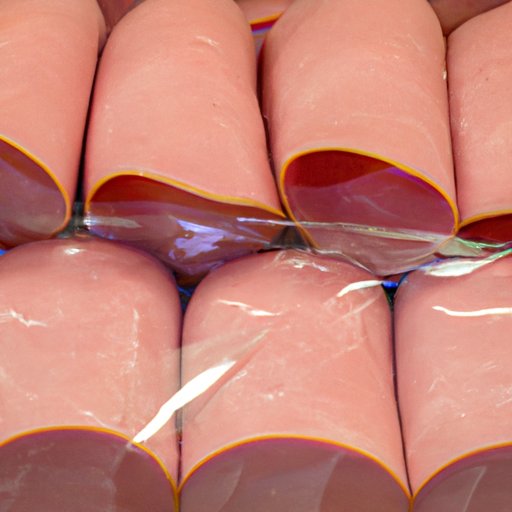Introduction
Deli meats are a popular and convenient meal option. They can be eaten on their own or used as an ingredient in sandwiches and salads. But are they healthy? This article will explore the potential health risks and benefits associated with eating deli meats.

Examining the Health Risks of Eating Deli Meats
When it comes to deli meats, there are several potential health risks that should be considered.
Potential for High Sodium Content
One of the main concerns about eating deli meats is the potential for high sodium content. Many types of deli meats are cured, which involves adding salt to preserve the meat and enhance its flavor. As a result, deli meats tend to be quite high in sodium. Consuming too much sodium can increase your risk of developing high blood pressure, which can lead to heart disease and stroke.
Risk of Contamination with Bacteria, Viruses, and Parasites
Another potential health risk associated with deli meats is the risk of contamination with bacteria, viruses, and parasites. Deli meats are often processed in unsanitary conditions, which increases the risk of contamination. Salmonella, E. coli, and listeria are all potential contaminants that can cause food poisoning if consumed.
Possible Link to Cancer
Finally, some studies have suggested a link between eating deli meats and an increased risk of certain types of cancer. This is mainly due to the fact that deli meats are often smoked, cured, or treated with nitrates and nitrites, which are known carcinogens. However, more research is needed to confirm this link.

An Overview of the Nutritional Content of Deli Meats
In addition to the potential health risks associated with deli meats, it’s important to consider their nutritional content. Here is an overview of the macronutrients and micronutrients found in deli meats.
Protein Content
Deli meats are rich in protein. A 3-ounce serving of cooked deli ham contains around 19 grams of protein, while a 3-ounce serving of cooked turkey breast contains around 22 grams. Protein is essential for building and repairing muscle, and it can also help keep you feeling full.
Fat Content
Deli meats also contain varying amounts of fat. For instance, a 3-ounce serving of cooked deli ham contains around 8 grams of fat, while a 3-ounce serving of cooked turkey breast contains around 1 gram. While some types of fat are beneficial for our health, it’s important to limit saturated and trans fats, as these can increase your risk of developing heart disease.
Sodium Content
As mentioned earlier, deli meats tend to be quite high in sodium. A 3-ounce serving of cooked deli ham contains around 770 milligrams of sodium, while a 3-ounce serving of cooked turkey breast contains around 570 milligrams. To reduce your sodium intake, look for lower-sodium varieties of deli meats or choose fresh meats instead.
Carbohydrates
Deli meats are relatively low in carbohydrates. A 3-ounce serving of cooked deli ham contains around 0.5 grams of carbohydrates, while a 3-ounce serving of cooked turkey breast contains around 0.2 grams.
Vitamins and Minerals
Deli meats are also a good source of several vitamins and minerals. For instance, a 3-ounce serving of cooked deli ham contains around 30% of your daily value (DV) of vitamin B12, while a 3-ounce serving of cooked turkey breast contains around 24% of your DV. Both types of deli meats are also good sources of zinc and iron.
Exploring the Environmental Impact of Deli Meats
In addition to the potential health risks and benefits associated with eating deli meats, it’s also important to consider their environmental impact. Here are some of the ways that deli meats can have an impact on the environment.
Pollution from Livestock Raising Practices
The production of deli meats involves raising livestock, which can have a significant environmental impact. Cattle, pigs, and other livestock produce large amounts of methane, a potent greenhouse gas. The production of animal feed and fertilizer can also lead to water pollution.
Waste from Packaging Materials
Packaging materials used for deli meats can also contribute to environmental pollution. Single-use plastics and other non-recyclable materials are often used to package deli meats, leading to increased waste and pollution. Whenever possible, opt for packaging materials that are made from recycled or recyclable materials.
The Pros and Cons of Eating Deli Meats
Now that we’ve explored the potential health risks and benefits associated with eating deli meats, let’s take a look at the pros and cons.
Pros
Deli meats can be a convenient and tasty meal option. They are also a good source of protein, and some types of deli meats are high in healthy fats such as omega-3 fatty acids. Additionally, deli meats can be a good source of certain vitamins and minerals, such as vitamin B12 and zinc.
Cons
The main downside to eating deli meats is the potential for high sodium content. Additionally, deli meats can be contaminated with bacteria, viruses, and parasites, and there may be a link between eating deli meats and an increased risk of certain types of cancer. Finally, the production of deli meats can have a negative environmental impact.

Investigating the Potential Health Benefits of Deli Meats
Despite the potential health risks associated with deli meats, there are also several potential health benefits. Here are some of the ways that deli meats can benefit your health.
High Protein Content
As mentioned earlier, deli meats are a good source of protein. Protein is essential for building and repairing muscle, and it can also help keep you feeling full.
Possible Source of Healthy Fats
Some types of deli meats are high in healthy fats, such as omega-3 fatty acids. These fats can help reduce inflammation and improve heart health.
Possible Sources of Vitamins and Minerals
Deli meats can also be a good source of certain vitamins and minerals, such as vitamin B12 and zinc. These nutrients are essential for maintaining good health.
Conclusion
Eating deli meats can be associated with both health risks and benefits. On the one hand, deli meats can be high in sodium and may be contaminated with bacteria, viruses, and parasites. Additionally, there may be a link between eating deli meats and an increased risk of certain types of cancer. On the other hand, deli meats can be a convenient and tasty meal option, and they are a good source of protein, healthy fats, and certain vitamins and minerals. When deciding whether or not to eat deli meats, it’s important to consider their potential health risks and benefits.
Summary of Findings
This article has explored the potential health risks and benefits associated with eating deli meats. It has examined the nutritional content of deli meats, the environmental impact, and the pros and cons of eating them.
Recommendations for Eating Deli Meats
If you decide to eat deli meats, it’s important to choose lower-sodium varieties whenever possible and opt for packaging materials that are made from recycled or recyclable materials. Additionally, make sure to cook deli meats thoroughly to reduce the risk of contamination.
(Note: Is this article not meeting your expectations? Do you have knowledge or insights to share? Unlock new opportunities and expand your reach by joining our authors team. Click Registration to join us and share your expertise with our readers.)
